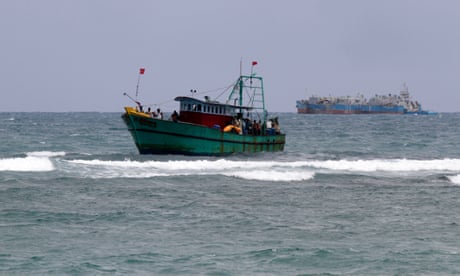- by foxnews
- 08 Apr 2025
Exploited in a crisis: why are Sri Lankan Tamils getting on boats bound for Australia?
Exploited in a crisis: why are Sri Lankan Tamils getting on boats bound for Australia?
- by theguardian
- 26 Jun 2022
- in news

The boat made it to Australia, but he was, he says, swiftly returned to Sri Lanka. A handful of questions and he found himself put onto a plane, and flown back to where he started, now facing charges.
But across the Indian Ocean, and against the backdrop of civil unrest and forecast widespread hunger in Sri Lanka, there are persistent concerns that asylum seekers arriving by boat in Australia are not having their claims for protection properly assessed, and that some may be forcibly and unlawfully returned to harm.
Others argue those boarding boats are coerced by a complex set of factors.
Since May, the Sri Lankan navy has intercepted at least 10 boats at sea, carrying 353 men, women and children: the youngest passenger was a month-old baby.
A further 53 people have been arrested on land, suspected of being about to board a boat.
But at least three boats have reached Australian waters between 24 May and 10 June, reportedly carrying 79 asylum seekers.
Sri Lanka is in the grip of an economic crisis that has fuelled widespread social and political chaos. The country has defaulted on more than $7bn in debts, its rupee has plummeted in value and inflation has risen beyond 40%.
Chronic shortages of fuel, kerosene, cooking gas and medication have sparked protests. The state has responded violently through the use of teargas, water cannons and rubber bullets.
But the human cost is acute. Last month, a baby died in the highlands town of Haldummulla after she fell ill at home; her parents were unable to source any petrol to rush her to hospital.
The senior police source says those who have been caught trying to leave Sri Lanka by boat are some of the poorest people in the country, from Tamil-majority areas previously ravaged by war such as Vavuniya, Killinochi, Mullaitivu and Trincomalee.
The fishing boats chartered for the voyage across the Indian Ocean are typically old, and barely seaworthy. One boat intercepted on 18 May sank as it was being towed back to Trincomalee.
A Sri Lankan navy spokesperson, Captain Indika da Silva, told the Sunday Observer human traffickers were exploiting the economic crisis.
A spike in boat arrivals has been argued by the opposition in Australia as being the result of the return of the Labor party to government, following the federal election on 21 May.
And the outflow of boats from Sri Lanka to Australia preceded the election.
Factors driving forced displacement and irregular migration are rarely singular, and are far more often multifaceted and intersectional.
More than a decade after the end of the bloody separatist civil war between the Sri Lankan military and the Tamil Tigers, Tamil-majority areas of Sri Lanka continue to face oppressive restrictions from state security services.
The economic crisis, and the hunger that flows from it, is felt most acutely by those already marginalised and potentially facing persecution.
Satkunanathan said those arrested trying to leave Sri Lanka should not be jailed or prosecuted.
There are concerns this abbreviated assessment process could fail to protect those who have fled Sri Lanka because of persecution.
As long ago as 2014, after Australia returned 41 Sri Lankan asylum seekers intercepted at sea, the UNHCR said the process was unlawful under international law.
* Jayan is a pseudonym. His name has been changed to protect him and his family.
- by foxnews
- descember 09, 2016
Ancient settlement reveals remains of 1,800-year-old dog, baffling experts: 'Preserved quite well'
Archaeologists have recently unearthed the remarkably well-preserved remains of a dog from ancient Rome, shedding light on the widespread practice of ritual sacrifice in antiquity.
read more


